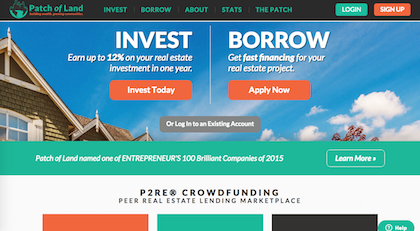Embarking on a tour is a huge step for a band, and if you plan on leveling up your music career, growing your fanbase, and upgrading your finances, a well-organized tour can be vital.
Unfortunately, tours are expensive.
You may need to cover the cost of transportation, food, lodging, venue fees, road crew, equipment, and more.
Suffice it to say, this can put a significant dent in your bank account, one that album sales and streaming royalties alone might not be able to cover.
There are many crowdfunding websites out there. Kickstarter is probably the largest, followed up by Indiegogo. There are pros and cons to each, that I go over here.
So, how do musicians get funding so that tours and other major projects can happen?
There are a couple of different ways you can get funding for your music, and in the digital age, you have access to a host of new tools like crowdfunding and eCommerce.
Here are 6 tips to fund or finance a music tour!
These also work if you’re trying to get funding for an album, music video, or other musical venture.
1. Start Small
If you’re a relatively new band that’s still growing your fanbase, you don’t have to take on the world right away. It might be more cost-effective to start with a more modest tour of nearby areas and smaller venues that you can reach without breaking the bank.
Take a look at your finances to see how much you can afford and set a budget for your tour accordingly.
You might not be able to afford extensive travel and transportation costs just yet, but that doesn’t mean you can’t scale back to put on an impressive tour all the same.
Your first tour will set the stage for your next one, and you can use the revenue you gather to fund an even bigger second tour.
2. Harness the Power of Online Crowdfunding
In the online age, crowdfunding is one of the major tools you can use to make money with music.
Through online crowdfunding, creators like you can create fundraisers and collect money from people who are interested in their projects.
Fans love crowdfunding just as much as musicians because it’s often important to them to support their favorite artists, so don’t be afraid to ask your fans to lend a hand with fundraising.
Whether or not you already have an active fanbase, you can use crowdfunding to raise money for a tour, album, music video, or almost any other creative project you can think of.
Of course, you can’t just set up a page and wait for the cash to start rolling in.
Successful crowdfunding campaigns are based on proven techniques and bolstered by deliberate marketing strategies.
If you’d like a comprehensive, step-by-step guide to crowdfunding for music, check out Music Crowdfunding Secrets: Fund Your Next Album, EP, or Tour, by CrowdCrux’s own Salvador Briggman. Get the free audio book with Audible’s 30-day Free Trial.
This book will tell you everything you need to know about the world of music crowdfunding and outline an easy-to-follow process for successful fundraising.
To get started with your own music crowdfunding campaign, try one of these popular platforms:
Kickstarter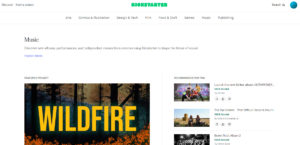
With a community of around 21.7 million backers, Kickstarter is by far the biggest and most popular crowdfunding platform in the world.
At the time of writing, over 68 thousand Music projects have been launched on Kickstarter, making Music the platform’s sixth most popular category.
Well-known artists like PIXIES, Toad the Wet Sprocket, and Amanda Palmer have all used Kickstarter to raise money for various projects. In 2017, R&B group TLC raised $430,255 on Kickstarter to fund their final album!
Kickstarter uses a rewards-based crowdfunding model, meaning you set a funding goal for your projects, and backers contribute money to your goal in return for rewards, which might take the form of concert tickets, CDs, or other merchandise.
But make sure you are using smart strategies to run your campaign because uses an all-or-nothing funding scheme, so if you don’t meet your goal, you won’t be able to keep any of the money you raise.
Indiegogo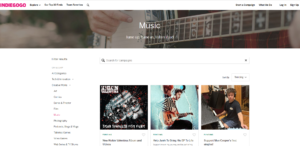
Indiegogo is Kickstarter’s biggest rival, and they have a sizeable community of musicians launching projects every day.
In fact, rock musician Paul Durham of Black Lab fame recently used the platform to raise $81,979 for his solo album.
Similar to Kickstarter, Indiegogo uses a rewards-based crowdfunding model in which your fans put up funds in exchange for special perks.
However, in addition to an all-or-nothing funding scheme, Indiegogo, also allows for flexible funding, so you can keep the money you raise even if you don’t meet your goals (you’ll still have to fulfill perks, though!).
GoFundMe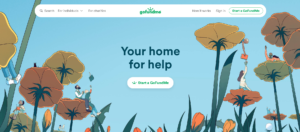
GoFundMe is a large crowdfunding platform specifically for charitable and personal causes, and that includes music tours!
GoFundMe doesn’t have a Music category, but it does feature a Creative category which musicians can use to pursue their dreams and level up their careers.
As with Kickstarter and Indiegogo, you’ll rely on backers to fund your individual project, but you don’t have to provide rewards.
Instead, you’ll have to sell your story and convince people why your tour is so important for you and your community.
Patreon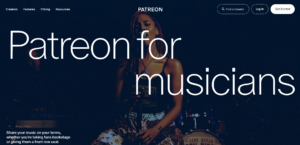
Founded by Jack Conte of Pomplamoose, Patreon has proved hugely popular with musicians over the past few years.
That’s because it uses a subscription-based model, allowing creators to get recurring funding for their whole careers rather than just one individual project.
Fans will pay a regular subscription fee for access to your Patreon community. In exchange, they’ll get access to exclusive rewards, which may include live streams, early releases, merchandise, or bonus content.
Since you have to keep your patrons coming back for more, you’ll have to constitute to put out new content and rewards, but Patreon is a great way to get recurring income to put towards a tour or other project.
Some popular musicians who use Patreon include Kina Grannis, Postmodern Jukebox, and Jack Stauber.
(By the way, if you decide to use crowdfunding to finance your music career, you’ll need a landing page that provides information about your campaign and helps you build an email list.
The easiest way to do this is through Leadpages, an awesome platform that helps you create a page and turn visitors into donors. Start a free trial today!)
3. Sell Merch
If you already have a significant fanbase, there might be quite a few people out there who would love to rep your band with merchandise like t-shirts, posters, stickers, buttons, CDs, etc.
Selling merch is a great way to generate some revenue to get funding for a band.
It doesn’t hurt to set up a merch table outside each concert venue, but there’s an even easier way to facilitate sales than that: eCommerce!
eCommerce refers to all of the buying and selling that happens on the internet, and it’s grown enormously over the past few years.
By setting up an online store, you can reach even more fans and streamline the process of selling merch.
4. Play a Fundraising Show
If you’re planning a tour, you’re probably already great at selling tickets and performing live, so why not play a fundraising show or two to finance your music?
Your fans will be thrilled to have an opportunity to see you live and support your upcoming ventures, and revenue from ticket sales can go straight into your tour fund.
Playing a fundraising show will also help generate excitement for your future projects and can double as a way to both raise money and promote your tour.
5. Enlist the Help of a Sponsor
Small businesses are often grateful for opportunities to gain exposure by networking with popular artists.
Some of them might be willing to put up some funds in return for a chance to have you represent their brand during your tour.
This works especially well if you secure a sponsorship from a business that has some relevance to your fanbase.
If you know of any local businesses that you think would make great sponsors, reach out and try to form a working relationship!
6. All of the Above
Depending on the size of your tour and the expenses you need to cover, you might struggle to raise enough funds using just one of these methods.
However, combining them all might be enough to get you where you need to be.
Most successful and financially lucrative musical projects are probably using many channels to generate income, and this is a smart business decision.
Not only will you raise more money, but your risk of failure is also a lot lower if you have multiple streams of revenue.
Conclusion
No matter where you are in your music career, you can use these tips to start raising money to get funding for your tour.
However, it’s important to note that none of these methods can guarantee instant income. You have to be prepared to put in effort and use best practices for this to work.
To learn the proven secret formula behind successful fundraising for music, don’t forget to check out Music Crowdfunding Secrets: Fund Your Next Album, EP, or Tour on Amazon now!





